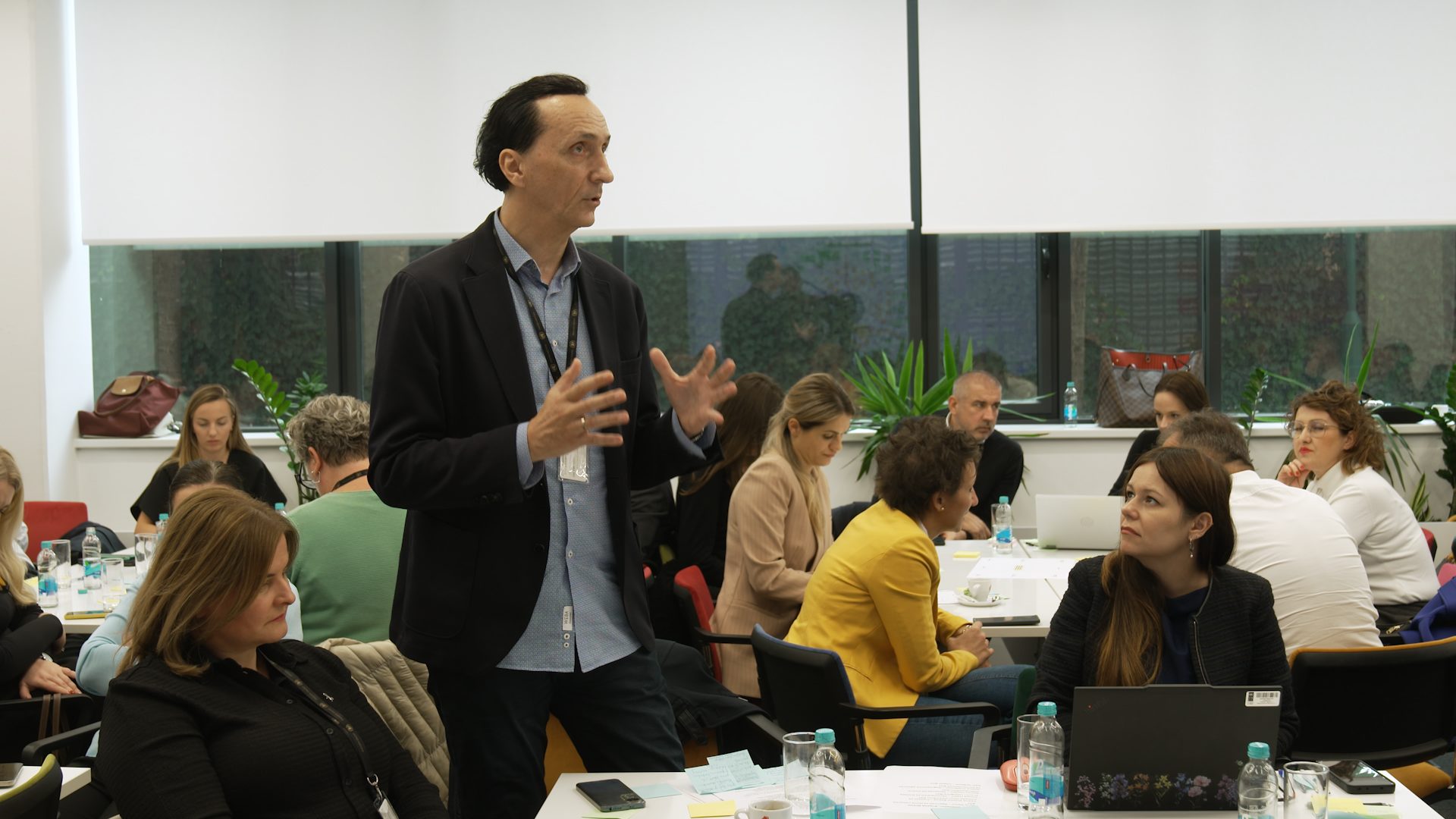This post is also available in: Bosnian
It’s the middle of October, and about 30 civil servants have gathered in Sarajevo to share their experiences with using artificial intelligence. Most of them admit that they use these tools at work, but they are encountering dilemmas because, so far, they have not received any formal training, nor have they been offered a safe, domestically-made safe tool to use.
This is the first time that they’ve got together to officially talk about artificial intelligence.
“For me, the biggest problem regarding this application and this technology is actually the security of the data, who controls it, and how accurate it is,” says one of the participants.
Most of them agree that artificial intelligence can help them improve their work. But one of them is worried that artificial intelligence tools are already being used too often.
“A surprising piece of information is the decline in the quality of staff performance, because they’re relying on AI models and AI solutions too often,” he says.
Recently, the state-level transport and communications minister, Edin Forto, announced that artificial intelligence would be officially introduced into the ministry’s work.
“I think, in a year or two, you will not recognise what you are doing now,” he told the civil servants at the training session in Sarajevo.
Chat GPT, which is probably the best-known artificial intelligence tool, already appears to know that civil servants in Bosnia and Herzegovina use the tool at work.
“Yes, there is data showing that civil servants in Bosnia and Herzegovina are already using artificial intelligence tools,” Chat GPT responded to the question when it was posed by Detektor.
According to a recent research, seven out of ten civil servants already use artificial intelligence in their work, but almost none of them have undergone any formal training yet.For digital technology expert Aleksandar Mastilovic, sharing data and information with an online artificial intelligence model means exposing the data to others.
“In practice, this means that if you put your finances there and ask it to process them for you, you have practically given it consent to learn about your finances,” Mastilovic said.
That’s how data can also reach the governments of other countries – and this is the reason why the location of servers used by artificial intelligence companies is important.
“I personally do not believe that OpenAI would refuse to cooperate with the US government if it requested access to some of this data, and then there are some countries that have created concepts like this that are not remotely as democratic as the United States. In that scenario, we no longer have to think about whether the data would be misused. It certainly would be,” Mastilovic said.
He believes that the solution is for Bosnia and Herzegovina to develop its own tools, which would not share data with other countries.
“Through this, we would achieve the protection of what is called the national interest, state secrets, anything confidential, or personal data that could be compromised, and the starting point for artificial intelligence would be much better that way,” he said.
The United Nations Development Programme, UNDP, conducted a survey among 500 civil servants in Bosnia and Herzegovina about whether they use artificial intelligence. More than 70 per cent confirmed that they already use these tools in their work.
Kemal Bajramovic, a digital adviser at UNDP Bosnia and Herzegovina, says that 95 per cent of civil servants claim not to have had any formal training in the use of artificial intelligence yet.
“What we’ve noticed is that civil servants really expect a systematic approach to introducing the use of artificial intelligence in the public administration, in the sense that they want to strengthen their own capacities, but, at the same time, they are seeking proper guidance about how to use artificial intelligence in a correct and responsible manner,” Bajramovic said.
Several state institutions responded to Detektor that their employees use artificial intelligence to improve their work, while others use it on their own initiative, without it being regulated.
State transport and communications minister Edin Forto recently announced that artificial intelligence would be introduced at his ministry.
“It’s about time to regulate this in a way that, whatever our civil servants use, we train them better on how to use it, and provide them with legally purchased, licensed tools. Basically, to not lag behind the rest of Europe. I can tell you that we are not lagging behind the rest of Europe,” Forto said.For Forto, the problem is that civil servants use free tools and share information without any restrictions. But he insisted that no special legislation is needed to start using artificial intelligence tools at state institutions officially, legally and safely.
“The Ministry of Transport and Communications of Bosnia and Herzegovina is the contractor for hundreds and hundreds of Microsoft licences that we have purchased for state agencies throughout the state of Bosnia and Herzegovina. Within that package, Microsoft offers artificial intelligence tools,” he said.
Forto wants civil servants to use AI in a regulated manner.
“And when we start using it, it should serve as an example of how the other 70 state agencies should use it. In my opinion, it can also serve as an example about how to do it for the entities, cantons, municipalities and anyone else,” he said.



